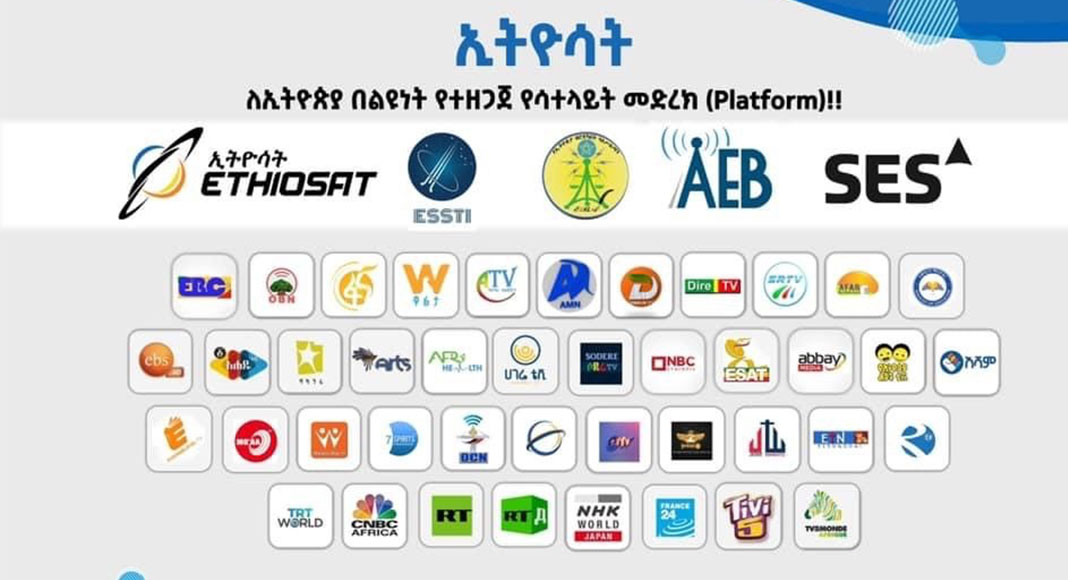
Provider says complaints are unfounded following considerable USD 4mln discount
Ethiopian television broadcasters are in an uproar over “unjust” satellite transponder lease fees charged by Ethiosat, a communication satellite platform launched by the government in 2017. A petition to the Office of the Prime Minister from the Ethiopian Media Council, a media lobby group, a month ago has yet to garner a response.
The Ethiopian Media Authority directed all broadcasting stations in the country to subscribe to Ethiosat in 2020, in a bid to cut down on the estimated USD 10 million they were paying out in lease fees to foreign satellite service providers. Ethiosat was established by the Information Network Security Agency (INSA) in partnership with SES, a satellite telecoms network based in Luxembourg.
No less than 70 broadcasters are paying more than USD 6 million collectively in lease fees each year – an amount the lobby group describes as unfair. Each broadcaster pays between USD 6,000 and 8,000 a month, with the fee varying based on the quality of the broadcast provided.
During the inaugural East African Broadcast and Digital Media Convention at the Hyatt Regency hotel on May 7, 2024, executives of the broadcasting institutions echoed their dissatisfaction of what they see as a broken promise on the part of the Ethiopian Broadcasting Authority in 2020, then under the directorship of Getachew Dinqu (PhD).
– Advertisement –
The convention brought together executives from media institutions and satellite providers for insightful discussions.
“First of all, the way the rental subscription was awarded collectively to Ethiosat was wrong. Media institutions should have been given the opportunity to rent from whatever foreign company they prefer,” said an executive who spoke to The Reporter anonymously on the sidelines of the meeting. “Secondly, we shouldn’t have to pay rent in dollars. Ethiopian broadcasters have no source of foreign currency, so why should we keep paying in dollars?”
The executive disclosed that good relations between broadcasters and banks had enabled them to make the payments on time thus far, but that might change.
“Banks are facing forex shortages, so they’re hesitant to provide us with forex,” he said. “We’re in serious trouble.”
The executive disclosed that attempts to negotiate alternative payment options with the Ethiosat provider, including the possibility of paying in birr, have been met with rejection.
Tewodros Shiferaw, the founder of Nahoo Television, was among those who staunchly opposed the transition to Ethiosat when it was first proposed several years ago. Nahoo abstained from leasing a transponder from Ethiosat until diminishing viewership forced the broadcaster to jump on the bandwagon.
Still, Tewodros maintains a dissenting stance, claiming that SES had initially agreed to avail its services and accept payments in birr. A lack of a formal agreement has since led the provider to demand payment in foreign currency, according to Tewodros.
Menen Agegnew, Ethiopia country manager for SES, denies that any such agreement, whether verbal or formal, had ever taken place.
She points out that Ethiosat is offering its services at a discounted rate already, pointing to the estimated USD four million reduction in annual lease fee payments broadcasters have enjoyed over the last few years.
Menen argues that Ethiosat and SES are not non-profits, and cannot lower rates for broadcasters any further. She told The Reporter that 17 of the 18 million households in Ethiopia with access to television are using Ethiosat.
Abdisa Yilma, director-general of the Ethiopian Space Science Institute, says the decision to introduce Ethiosat was prompted not only by a request from the Broadcasters Association, but also by the potential advantages the move could offer the country and its broadcast institutions. He stressed the importance of conducting research to evaluate whether the approach has effectively met its objectives.
Transitioning away from Arabsat, which charges fees similar to Ethiosat and which Ethiopia had relied on for more than two decades, presented its own challenges, according to broadcasters.
Tewodros called for a dynamic solution to the problems facing the media, which he described as the fourth branch of government. He wants to see the government provide a forex guarantee, allowing media organizations to deposit equivalent values in birr into closed accounts. He argues this would offer a degree of financial stability and assurance.
Tamrat Tarekegn, deputy manager of the Council, also underscored the urgency of addressing systemic issues within the wider media industry. He called for an open line of dialogue and collaboration with the Prime Minister to solve the problems weighing down print, broadcast, and digital media platforms.
The Deputy Manager noted that the Prime Minister has had no direct contact with the media or journalists over the last six years. Tamrat disclosed the Council had submitted a formal request to the PM last month, urging for a meeting.
.
.
.
#Broadcasters #Cry #Fault #unjust #Satellite #Lease #Payments
Source link











